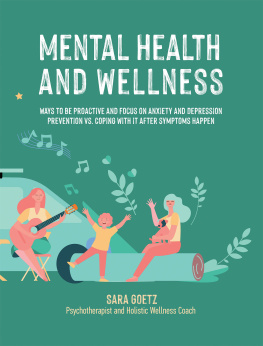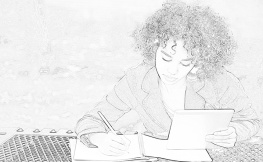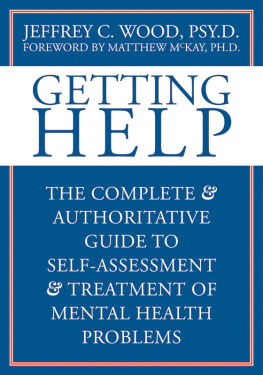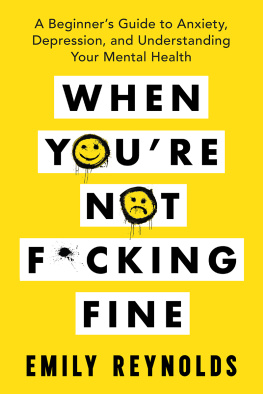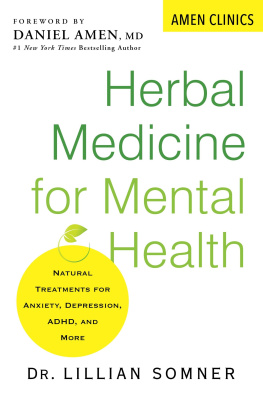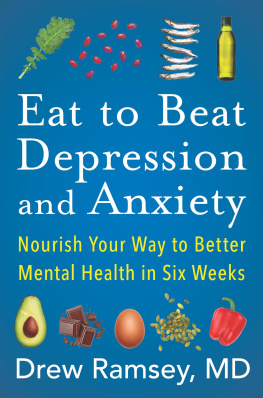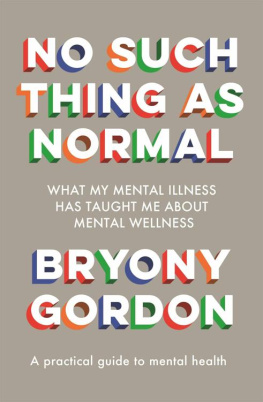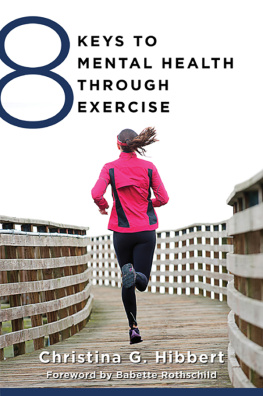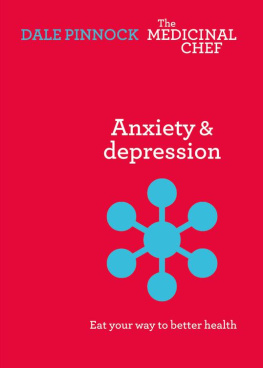MENTAL HEALTH
AND WELLNESS
WAYS TO BE PROACTIVE ADN FOCUS ON ANXIETY AND DEPRESSION
PREVENTION VS. COPING WITH IT AFTER SYMPTOMS HAPPEN
SARA GOETZ
Psychotheraphist and Holistic Wellness Coach
Copyright 2021 Sara Goetz.
All rights reserved. No part of this book may be used or reproduced by any means,
graphic, electronic, or mechanical, including photocopying, recording, taping or by
any information storage retrieval system without the written permission of the author
except in the case of brief quotations embodied in critical articles and reviews.
Balboa Press
A Division of Hay House
1663 Liberty Drive
Bloomington, IN 47403
www.balboapress.com
844-682-1282
Because of the dynamic nature of the Internet, any web addresses or links contained in
this book may have changed since publication and may no longer be valid. The views
expressed in this work are solely those of the author and do not necessarily reflect the
views of the publisher, and the publisher hereby disclaims any responsibility for them.
Any people depicted in stock imagery provided by Getty Images are models,
and such images are being used for illustrative purposes only.
Certain stock imagery Getty Images.
ISBN: 978-1-9822-7054-4 (sc)
ISBN: 978-1-9822-7053-7 (e)
Library of Congress Control Number: 2021912602
Balboa Press rev. date: 07/09/2021

Contents
Most therapists focus on discussing the problem and what coping skills might help after the symptoms occur. This is negative and reactive versus being proactive and focusing on solutions and clients strengths. Focusing on the positives, self-awareness, solutions and strengths, gives the control back to the client because they are being proactive and developing healthy life habits for mental, physical, emotional and nutritional health. You have the power to change your life. There are natural, holistic things you can do to help!

Lord Jesus, thank you for your support, guidance and ideas on what to include in this book so that I am able to help as many people as possible while spreading information and suggestions on how individuals can positively transform their life.
I am so very grateful for my kids who are my life. Thank you for being patient, supportive and helpful while Ive worked on this book. You two are awesome and Im blessed to have you in my life. I love you to the moon and back.
Other products offered by Sara Goetz include online
8 - week holistic, strategic therapy programs for teens,
adults and families. To find out more email the author at
and goetzwellness.com.
This feeling will pass. The fear is real but
the danger is not. Cammie McGovern
Excessive worrying
Feeling Agitated
Restlessness
Fatigue
Difficulty Concentrating
Racing Heart
Dizziness
Nausea
Lump in the throat
Heart palpitations
Sudden weight loss
Feel like passing out
Sweating
Shaking
Knot in stomach
Body jolts
Restless legs
Night sweats
Head pressure
Bloating
Depersonalization
Memory loss
Weak limbs
Hot flashes
Body pain
Difficulty breathing
Giddiness
Eye strain
Eye tics
Tightness
Numbness
Facial tics
Stuck thoughts
Cold chills
Headaches
Brain zaps
Falling sensation
Sweating
Shaking
Knot in stomach
Weak legs
Blurred vision
Lightheaded
Ringing in ears
Crazy thoughts
Yawning
Chest pressure
Tight band around the head
Hearing loss
Trauma
Financial Stress
Stress from quarantine or fear of the pandemic
Side effect of medication
Stress due to illness, work, issues with friends, school, family issues.
Things not going as planned or expected
Worried about what others think about you
Side effect of drug use
Lack of sleep
Caffeine
Alcohol
Skipping meals blood sugar drop
Negative thinking
Social events
Conflict
Public events or performances
Soda
Chemicals found in foods
Preservatives
Happiness can be found even in the
darkest of times, if one only remembers to
turn on the light. Albus Dumbledore from
Harry Potter and the Prisoner of Azkaban
Trouble concentrating or memory loss
Fatigue
Feelings of guilt or worthlessness
Hopelessness or helplessness
Pessimism
Insomnia or sleeping too much
Irritability
Overeating or appetite loss
Restlessness
Persistent sad, anxious or feelings of emptiness
Not caring or loss of interest in things you once cared for
Suicidal thoughts or attempts
Feeling stuck in a bad/unfulfilling job
Trauma Physical, mental or verbal abuse
Conflict
Certain medications side effects
Grieving a death or a loss
Major events
Serious illness
Alcohol
Caffeine
Drug use
Theres a fine line between reflecting and analyzing ones thoughts, feelings, and situations that have happened. Reflecting on what happened, why something triggered a reaction or how you might want to respond differently in the future is a great way to learn and grow. Reflecting is a light, non-judgmental way to review a situation. Analyzing a situation takes reflecting to a much deeper, self-sabotaging mental space. Not much, if anything at all, is learned from analyzing because this leaves the person feeling awful about the situation and about oneself.
I have noticed with my patients, that light reflection at the end of the day can be very useful. Reflecting on the good things that happened that day can leave the individual feeling accomplished and have a positive impact on their confidence and self-worth. Reflecting on the negative things that happened that day or the issues that triggered anxiety or depression symptoms can help the individual make changes to their daily schedule to avoid triggers or treat them like exposure therapy and use proactive tools to cope with triggers in a healthier way.
Look at the last few days and notice times when you analyzed a situation, event, conversation, or something that might be coming up. Now look back and notice times when you reflected on situations, events, conversations or something coming up. Can you notice a difference in how you physically and mentally felt between the times you reflected versus the times you analyzed something?
Not until we are lost do we begin to understand ourselves. Henry David Thoreau
When one overthinks to the point where they cant make a decision because they are so focused on making the perfect decision, its as though they are mentally paralyzed. There might not be a perfect option or choice and analyzing our situation to the point that it is almost impossible to make a choice is very common for individuals who have anxiety or depression. Again, reflecting on the situation and the options is a good thing but ruminating or analyzing takes reflecting to an unhealthy level.
This will often lead to an increase in self-doubt, skepticism, anxiety and depression symptoms. Being unable to make choices in our lives, or feeling as though we arent going to make the right choice, can be extremely frustrating. In these situations, high levels of stress hormones can be released and over time these times of analysis paralysis can negatively impact the individual physically as well as mentally.
Next page
